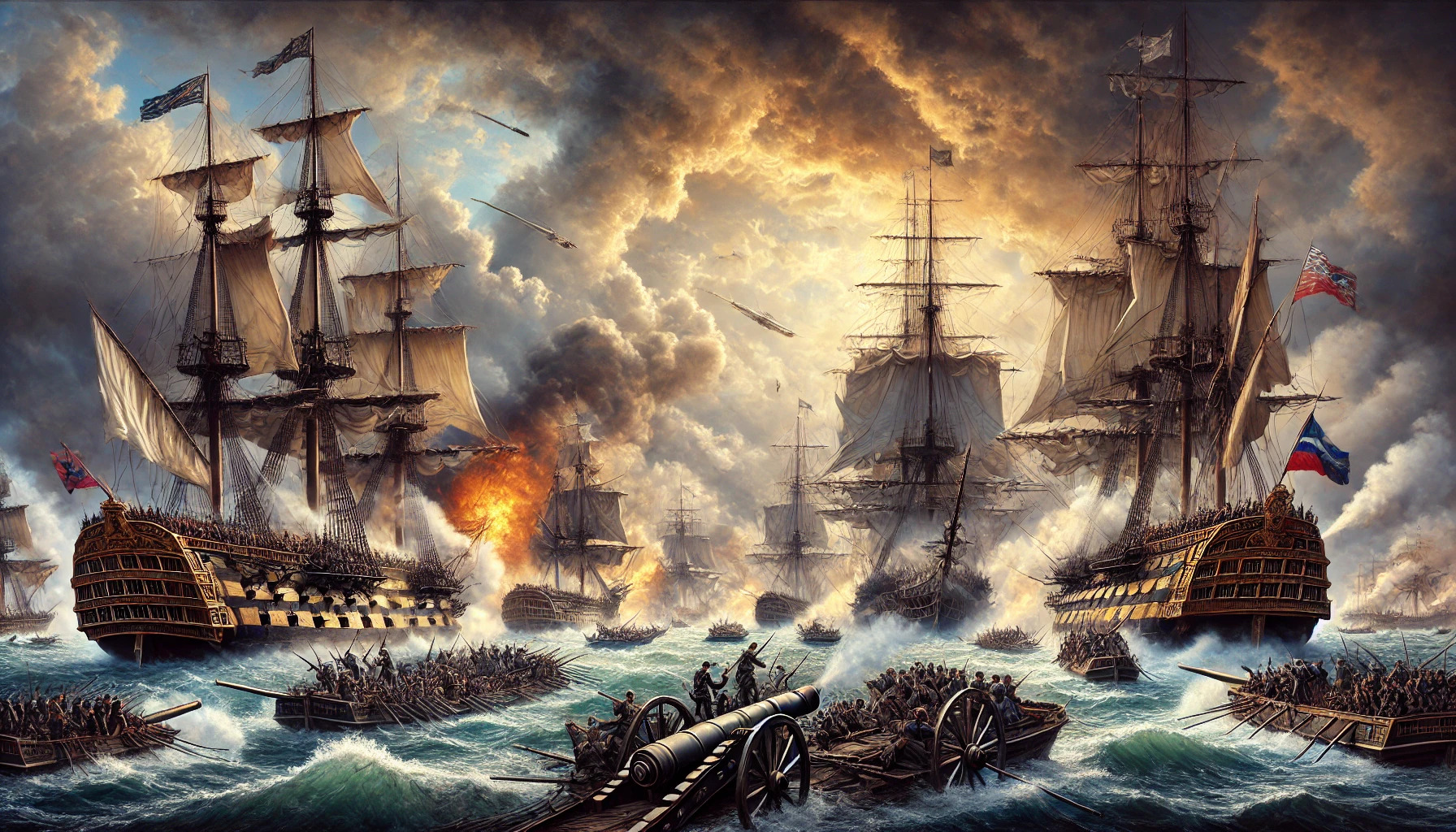Naval battles have played a crucial role in shaping the course of history. From ancient times to modern warfare, the strategic significance of naval power has been undeniable.
Throughout history, key naval battles have marked turning points in critical conflicts. The use of innovative tactics and technology, such as ironclad warships, transformed how battles were fought. Readers will discover how decisive maritime confrontations helped shape nations and alter the very fabric of society.
By exploring some of the most impactful naval battles, one can appreciate the complexities of maritime warfare. Understanding these events gives insight into the evolving nature of military strategy and the enduring importance of naval dominance in global affairs.
Foundational Naval Engagements
Two foundational engagements, the Battle of Salamis and the Battle of Actium, significantly influenced the course of empires.
Battle of Salamis
The Battle of Salamis occurred in 480 BC during the Persian Wars. This clash involved the Greek city-states banding together to face the powerful Persian navy led by King Xerxes.
The Greeks, using smaller and more maneuverable ships called triremes, outsmarted the larger Persian vessels. The battle took place in the narrow straits of Salamis, where the Persians struggled to organize effectively.
The victory at Salamis was pivotal. It not only boosted Greek morale but also marked the beginning of the end for Persian dominance in Greece. This engagement proved that a united coalition could defeat a larger force.
Battle of Actium
The Battle of Actium took place in 31 BC and was a crucial naval conflict between Octavian and the combined fleet of Mark Antony and Cleopatra. It was a decisive moment in the struggle for control of the Roman Empire.
The naval forces faced off near the Ambracian Gulf in western Greece. Octavian’s fleet, commanded by Agrippa, outmaneuvered Antony’s ships, using superior tactics and discipline to secure victory.
After their defeat, Antony and Cleopatra retreated, leading to their eventual downfall. The result of this battle solidified Octavian’s power, paving the way for his rule as Augustus and marking the start of the Roman Empire.
Age of Discovery Conflicts
The Age of Discovery was marked by intense naval conflicts that shaped empires and influenced global trade. Key battles like the Battle of Diu and the clash of the Spanish Armada played crucial roles in determining maritime power.
Battle of Diu
Fought in 1509, the Battle of Diu was a significant naval engagement between the Portuguese and a coalition of local forces, including the Ottoman Empire. This battle took place off the coast of India and was pivotal for establishing Portuguese dominance in the Indian Ocean.
The Portuguese, led by Admiral Afonso de Albuquerque, showcased advanced naval tactics and superior firepower. They successfully defeated local rulers and marked a turning point in the struggle for control over lucrative trade routes.
The victory at Diu solidified Portugal’s influence in Asia. It opened up new opportunities for trade and expanded European presence in India, changing the course of maritime history in the region.
Spanish Armada
The Spanish Armada, launched in 1588, was a massive fleet sent by King Philip II of Spain to invade England. This historic maritime conflict was driven by political and religious tensions, particularly Protestant England’s opposition to Catholic Spain.
The fleet faced a challenging task against the English navy, commanded by figures like Sir Francis Drake. English ships were smaller and more maneuverable, allowing them to outfight the larger Spanish galleons.
The defeat of the Armada was a turning point. It not only marked the decline of Spanish naval supremacy but also established England as a rising sea power. This shift influenced the balance of power in Europe and the Americas for years to come.
Nineteenth-Century Naval Warfare
During the 19th century, naval warfare experienced significant changes due to technological advancements and strategic shifts. Key battles marked this era, showcasing the evolution of tactics and naval power.
Battle of Trafalgar
The Battle of Trafalgar occurred on October 21, 1805. It took place off the coast of Spain between the British Royal Navy and the combined fleets of France and Spain.
Admiral Horatio Nelson commanded the British forces. His famous tactics involved breaking the enemy line, which led to a stunning victory.
In this battle, the British lost no ships, while the enemy lost 22 out of 33 vessels. The victory ensured British naval superiority for over a century and had profound effects on the Napoleonic Wars.
Battle of Tsushima
The Battle of Tsushima, fought on May 27-28, 1905, was a major confrontation in the Russo-Japanese War. It took place between the Imperial Japanese Navy and the Russian Baltic Fleet.
Admiral Togo Heihachiro led the Japanese forces, demonstrating superior strategy and speed. The Japanese fleet decisively defeated the Russians, sinking or capturing nearly their entire fleet.
This battle showcased the effectiveness of modern naval tactics and marked Japan’s rise as a global power. It also highlighted the importance of preparedness and strategic planning in naval conflicts.

